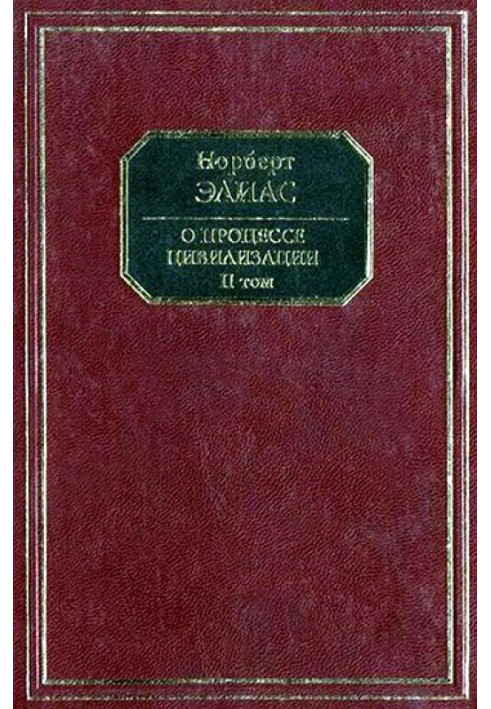About the process of civilization. Volume II. Changes in society. Civilization Theory Project
 Instant download
Instant download
after payment (24/7)
 Wide range of formats
Wide range of formats
(for all gadgets)
 Full book
Full book
(including for Apple and Android)
Norbert Elias (1897–1990) was a German sociologist, author of numerous works on general sociology, the sociology of science and art, who sought to overcome structuralist staticism in the interpretation of social processes. Elias’ ideas are most influential in Holland and Germany, where there are associations of his followers. In his main work “On the Process of Civilization. Sociogenetic and Psychogenetic Research" (1939) Elias developed an original concept of civilization, combining in a single theory of social change numerous data obtained by historians, anthropologists, psychologists and sociologists in isolation from each other. Using rich historical and literary material, he traced the transformation of the psychological structures, habits and manners of people in Western European society from the Middle Ages until our time, showing the connection of this transformation with social and political changes, as well as the influence of these processes on the formation of those forms of behavior that in modern society are considered “civilized” and “cultural.” Addressed to a wide range of readers interested in problems of cultural history, sociology and philosophy.
Data sheet
- Name of the Author
- Норберт Элиас
- Language
- Ukrainian
- Release date
- 2001
- Translator
- Алексей Михайлович Руткевич
Reviews
Вражаюча праця, що відкриває нові горизонти розуміння цивілізації!
Книга Норберта Еліаса "Про процес цивілізації. Том ІІ. Зміни у суспільстві" є справжнім шедевром соціологічної думки. Автор майстерно поєднує історичні, соціальні та психологічні аспекти, створюючи цілісну картину еволюції західноєвропейського суспільства. Його концепція цивілізації, що базується на багатому матеріалі, дозволяє читачеві глибше зрозуміти, як соціальні та політичні зміни вплинули на формування сучасних норм поведінки. Особливо вражає, як Еліас демонструє трансформацію психологічних структур та звичок людей, що робить цю книгу важливою не лише для соціологів, а й для всіх, хто цікавиться історією культури та філософією. Незважаючи на деякі недоліки в перекладі, загальна якість тексту залишається високою, і я б рекомендував цю книгу всім, хто прагне розширити свої знання про цивілізацію та її розвиток.















